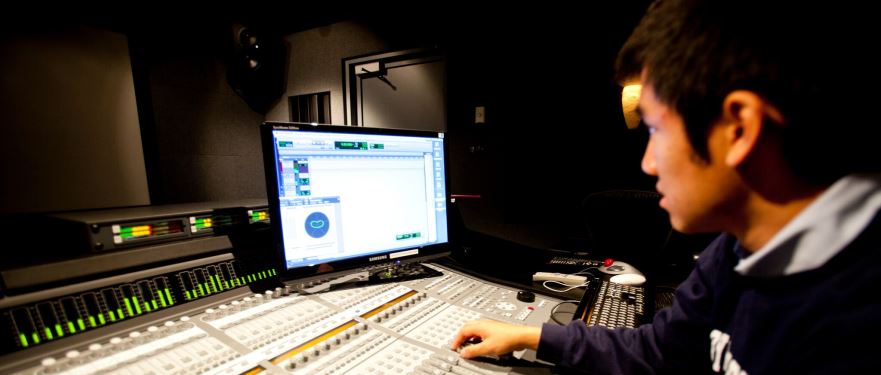Recording Arts
What is Recording Arts?
LMU's Recording Arts major gives equal emphasis to film and television sound, as well as to music engineering and production. Students explore the theoretical and practical elements of sound recording, sound reproduction, and sound design - the fundamentals crucial to successful work in all media that tap into the creative power of sound.
The Recording Arts major teaches students to grasp the transformative power of challenging and meaningful art, and the collaborative and rigorous nature of working in sound for music, film, and television. Students come to understand the potential of sound design to enrich visual storytelling and the cultural impact and significance of sound design.
Students put their knowledge and creativity to work at the School of Film and Television's sound stages, studios, and audio workstations. Students gain experience with film and television sound production, and produce advanced multi-track music recordings. The music portion of the Recording Arts program emphasizes the working relationship between the engineer/producer and the music artist.
What do Recording Arts majors do?
Recording Arts majors examine the physical and psychoacoustic properties of sound, the techniques of making, editing, and processing sound recordings, and the aesthetic contribution of sound to media.
Majors make technically competent recordings of music, and do production and post-production sound for film and television, working in close collaboration with Production majors from the School of Film and Television. Students edit and process sound for those media, and create technically competent and aesthetically pleasing mixes.
Students also take two lower division music classes. One deals with the fundamentals of music theory; the other provides practical experience in playing keyboards. In upper division courses, students study the science of sound behavior, reproduction and modification. Students also learn audio techniques that apply to film and television sound, and music recording.
Is this major right for you?
You might be a Recording Arts major if you:
- Seek a career in film sound
- Seek a career as a music producer or engineer
- Are a sonic storyteller
- Enjoy the collaborative process
- Like music theory and history
- Have good computer skills
- Are creative and disciplined
About our faculty
Our faculty members are experts in fields such as production sound and sound design for film and television; music composition for theater, film, radio, and television; re-recording mixing; and sound editing.
Faculty members belong to the Motion Picture Sound Editors and other guilds. Faculty members have worked on feature films such as "Waterworld" and "X Files: Fight the Future" as well as award-winning documentaries, independent films, commercials, and experimental animated videos. Faculty members have also composed music for film and television. They have studied and worked internationally. One professor was a Disney Imagineer at Tokyo Disneyland and Epcot.
About our students and graduates
Our majors receive valuable assistance from the School of Film and Television's Office of Industry Relations. This office is our students' lifeline to the entertainment industry. The office assists with a comprehensive set of programs that includes career advisement and help with developing portfolios. The office also connects students with key internships, industry mentors, School of Film and Television alumni, and agents, managers, guilds and professional associations.
Our distinguished alumni have had careers in entertainment and many other industries. Alumni have won the Academy Award for Sound Re-Recording and Emmy Awards for Outstanding Sound Editing for an Original Series and Outstanding Sound Editing for Non-fiction Programming. An alumnus won a Motion Picture Sound Editors Golden Reel Award for Sound Editing.
Representative courses
Our courses have included:
- Sound Design
- Digital Sound Editing
- The Nature of Sound
- Art of the Cinema
- Production Sound Techniques
- Production 1
- Post-Production Sound
- Advanced Post-Production Sound
- Live and Studio Recording
- Multi-Track Studio Recording
- Advanced Audio
- Senior Recording Arts Project
- Contemporary Issues: Recording Arts
- Seminar in Sound
- Independent Studies
- Music Business
- Movie Music
